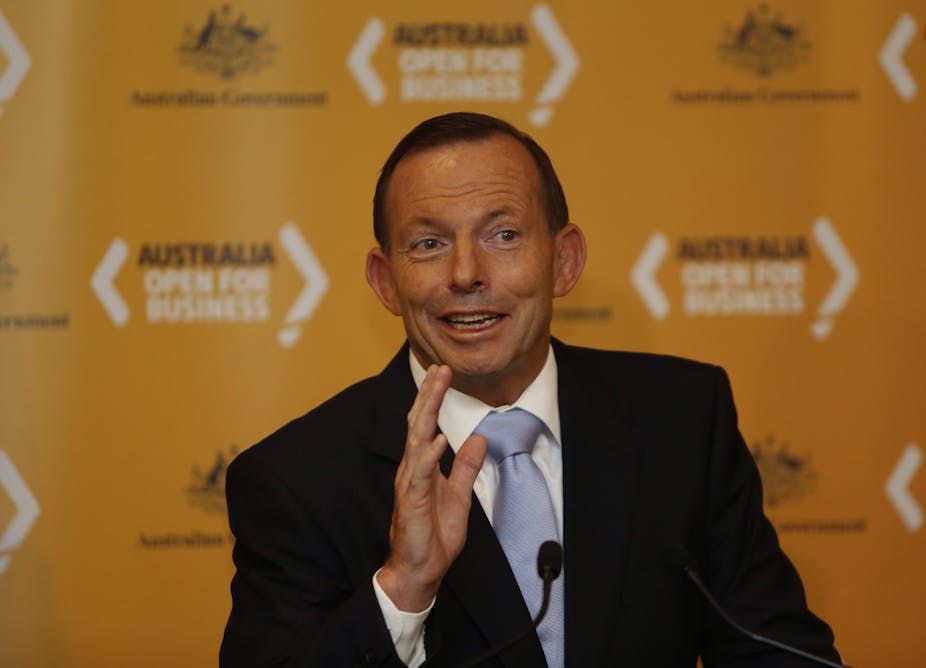Despite the misgivings of the sceptics, prime minister Tony Abbott’s high-profile, potentially high-risk trade mission to northeast Asia could be a triumph. The free trade agreement (FTA) with Japan is a major achievement, although Abbott was clearly pushing on a door that was at least partially open. After years of trying, the Abe government finally seemed equally keen to seal a deal because it fitted its own domestic reform agenda.
The mission’s experience in China could be altogether different – not least because of the warmth of its reception in Japan. The seemingly implacable reality in northeast Asia is that economic ties cannot be separated from the geopolitical context in which they are embedded.
The Japan question
While Australian officials might be keen to emphasise the pragmatic, business-oriented nature of Abbott’s mission, their Chinese hosts in particular will be paying very close attention to what is said elsewhere and the impact this may have on their own fractious intra-regional relations.
This is why Abbott’s remark about Japan being Australia’s “best friend” in the region went down so badly in China. The symbolism of Abbott’s address to Japan’s National Security Council will not be lost on China, either. China’s security hawks are already indignant about Australia’s high-profile support of the rebalancing of American forces toward the Asia-Pacific. Closer ties between traditional allies and potential foes will only fuel Chinese paranoia.
Just how peeved the Chinese are with Australian policy could be seen in the reaction to Australia’s relatively mild criticism of China’s recently expanded Air Defence Identification Zone. On her inaugural visit as foreign minister, Julie Bishop received an unprecedented public dressing down from her counterpart, Wang Yi.
Positive signals
And yet, the signals coming out of Beijing are not all bad. At least some Chinese officials recognise the possible benefits of getting the economic relationship right.
Chinese premier Li Keqiang suggested in his high-profile, agenda-setting address to the recent National People’s Congress that progress toward a free trade deal with Australia should be accelerated. This may be Beijing’s version of diplomatic good cop/bad cop, or it may be a manifestation of the conflicted and ad hoc nature of the policymaking process in China.
Either way, policy in China toward Australia would seem just as ambivalent at times as Australia’s is toward China. Both parties are compelled to take the relationship seriously, though, no matter how inherently unlikely it may seem given their striking historical and political differences.
China alone accounts for more than 30% of Australian exports, and the proportion continues to grow. Most of this growth is centred on resources, but China is also the number one market for Australia’s agricultural sector, which is seen by many as a key future growth industry. Even some of the more sophisticated parts of the beleaguered manufacturing sector, such as medical and pharmaceutical products, are becoming more reliant on the Chinese market.
While China is easily Australia’s largest trading partner, Australia is only seventh on China’s list. China has the greater potential economic leverage, but it is not easily exploited, especially as Australia enjoys the benefits of proximity and reliability.
Chinese policymakers may not like Australia’s strategic priorities and its closeness to the US, but “punishing” Australia might create more problems for China than it solves.

Future prospects
Greater trade and economic interdependence is, of course, a good thing.
There is no doubt that countries that rely on each other economically are likely to behave differently toward one another as a consequence – to a point. Unfortunately, China’s increasingly troubled relationship with Japan also provides a salutary reminder of the limits to this idea. Massive mutual gains from their bilateral trade have not guaranteed cordial relations between the region’s bitterest of rivals and historical foes.
While Australian security policy remains non-negotiable and seemingly impervious to changing strategic realities, it might benefit from being rather more independent.
Holding out the prospect that Australia might be susceptible to the sort of charm offensive that saw the ASEAN states reap unsolicited, unexpected and unreciprocated trade benefits from China might be a useful bargaining chip. As it is, China’s policymakers know exactly what to expect from Australia and how little flexibility there is in certain areas.
Nevertheless, achieving a FTA with China would be a major achievement for the Abbott government. The danger is that having flagged this as a key performance indicator in advance, they may be prepared to sign even a bad deal for political rather than economic reasons. This would not be unprecedented: the Howard government’s free trade deal with the US had more to do with geopolitics than economics.
In this regard, at least, John Howard’s claim about not having to chose between history and geography looks increasingly less persuasive. Plainly, some of our northeast Asian neighbors are doing this all the time with potentially disastrous results. China’s actions and regional importance may yet force Australia’s policymakers to make similar sorts of calculations.
Editor’s note: Mark will be available to answer questions in an Author Q&A session between midday and 1:30pm tomorrow, April 10 (Australian Eastern Standard Time). Post your comments below.

